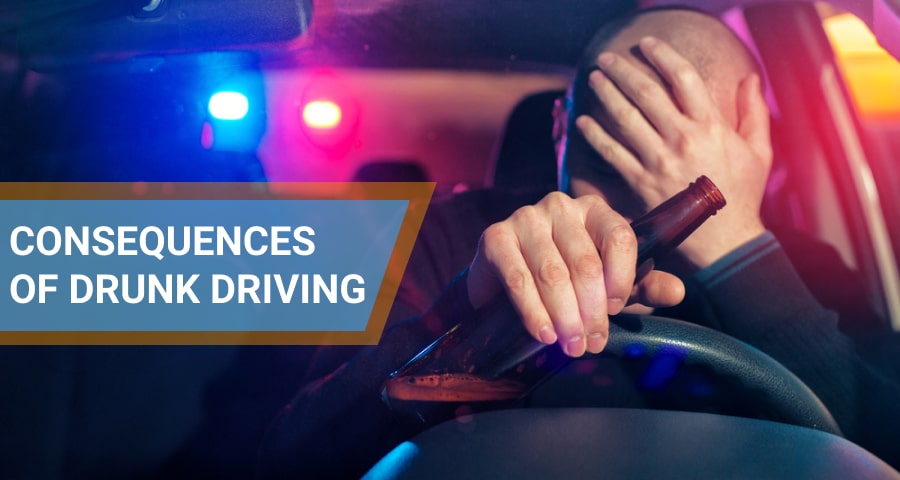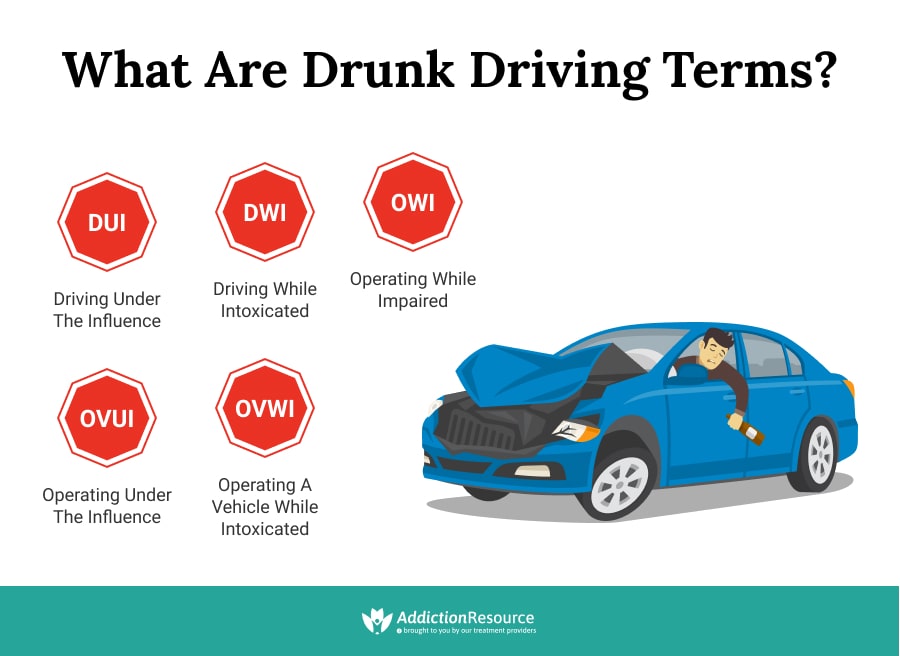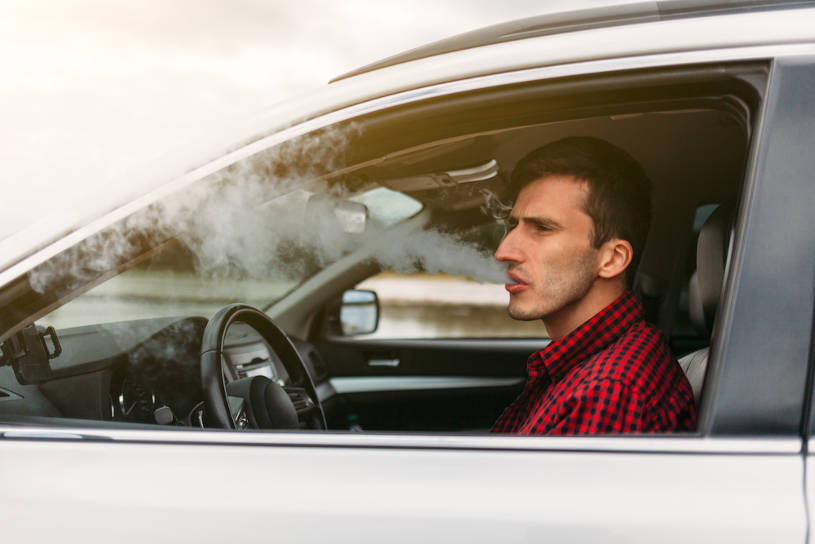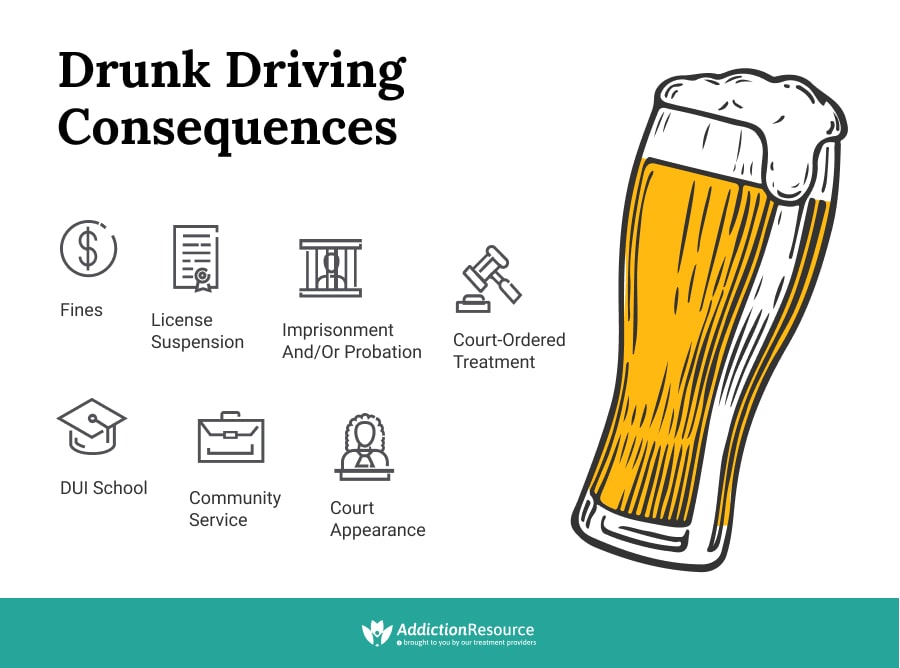
What is a DUI? DUI stands for Driving Under the Influence of drugs and/or alcohol. Any person caught driving a vehicle with a blood-alcohol level that exceeds the legal limit will get a DUI charge. There are so many complexities for what counts as DUI and DWI. The DWI vs. DUI misinterpretation will be explained in detail.
Table Of Contents:
This comprehensive guide provides insight on the statistics of DUI and DWI and the essential differences between them. In addition, it includes information on the BAC level that qualifies as driving under the influence, drug tests used for it, the conditions associated with driving while impaired and the drug types, the legal consequences of drunk driving such as the DWI charge, and preventive measures to avoid DUI and DWI.
How Many People Die From Drunk Driving in the Us?
Tragically, 10,265 people died in alcohol-impaired driving crashes in 2015. This is according to the National Highway Traffic Safety Administration. Currently, driving under the influence accounts for 29 percent of all motor vehicle crashes. In the United States, at least 28 people lose their lives daily to crashes caused by drunk driving. In 2019, 10,142 drunk driving deaths were recorded from crashes. The problem of driving under the influence has persisted over the years, consistently taking innocent lives, even though it can easily be prevented. In 2016 drunk driving accounted for 28% of all deaths related to road traffic, with a body count of 10,497.
Here Are Some Disturbing and Problematic Facts About Driving While Impaired:
- In 2016, up to 1 million drivers were arrested for one form of DUI or the other. This number is only 1% of 111 million drunk driving cases self-reported yearly in the US.
- Marijuana is an increasing factor in car crashes, contributing to at least 13% of the cases.
- About 17% of the 1,233 traffic accidents in 2016 involved drunk driving.
- Deaths caused by alcohol-impaired motor vehicle crashes account for 31 percent of all motor vehicle crashes.
- One person dies every 52 minutes from a motor vehicle crash involving an alcohol-impaired driver.
What Is the Difference Between DWI vs DUI?
The terms DWI vs DUI are often used interchangeably and construed to mean the same offense. Both offenses are linked to using drugs and alcohol inappropriately while driving a vehicle. None is worse or milder than the other. Various states have different references for comparison. DUI may be interpreted as driving while under the influence of alcohol or illegal and legal drugs. At the same time, DWI charge is mostly connected with a blood alcohol level (BAC) test that is above the legal blood alcohol level limit.
This Offense Has Different Names:
| Term | Meaning |
| DUI | Driving under influence, this is mostly related to alcohol, but can also be used for legal and illegal substances as well as toxic vapors |
| DWI | Driving while intoxicated or impaired. Mostly synonymous with DUI although it may differ in from state to state based on the substance in question or type of impairment. |
| DWAI | Driving while ability impaired from alcohol or drugs. This is typically driving under the legal BAC limit of 0.08% but a lesser offense to DWI |
| DWUI | Driving while under the influence |
| OMVI or OVWI | Operating a motor vehicle while intoxicated |
| OUI or OVUI | Operating under the influence |
| OWI | Operating while intoxicated or impaired |

DUI and DWI State Comparisons
The consequences of DUI and DWI offenses may differ from one state to the other depending on the factors and individuals involved in the offense. States like Georgia, Tennessee propose a necessary jail time even for first-time offenders. In contrast, Wisconsin may undermine first-time charges. However, certain policies are largely implemented in most states; the suspension of a driving license. In addition, mandatory, court-ordered community service and compulsory participation in an educational program for drivers may be enforced. The legal, financial implication of driving while impaired is also similar.
The legal definition of “under the influence” is as follows:
Affecting the nervous system, brain, or muscles of a person as to impair, to an appreciable degree, the individual’s ability to drive a vehicle in the manner that any ordinarily prudent and cautious man, in full possession of his faculties, using reasonable care, would drive a similar vehicle under like conditions.
Can One Get a DUI for Marijuana?
In many states, yes. DUI convictions are not so easy to obtain for this cause. Someone might operate a vehicle under the influence of marijuana instead of alcohol and then gets pulled over by the police. Typically, the breathalyzer cannot detect cannabis, so the amount been used cannot be measured to ascertain if the driver is impaired.
However, due to modern innovations, a new breathalyzer invention is being designed to detect the presence of tetrahydrocannabinol (THC), so in the future, it would be easy for the offender to be caught driving while impaired.
The drug “per se” charges are less parallel to alcohol-impaired driving in the sense that there is less legal tolerance (zero tolerance) for driving with the presence of drug metabolites in one’s system. While some states have cutoff levels for certain substances, other states completely prohibit the use of drugs at any level while driving. However, the prosecution must prove that drug use caused the driver’s impairment mentally and/or physically while driving. This happens in many states. This can be difficult to prove considering that the THC breathalyzer is still under development and is not ready for the field; hence the degree of impairment from the drug cannot be determined on the spot. Also, it’s hard to know how long the drug would have caused the driver to be impaired. Nonetheless, a DUI conviction is possible. This can be done using blood tests, drug recognition experts, sobriety tests, and other tools.

Can One Get a DUI For Taking Painkillers That Were Legally Prescribed?
Yes. This is just like a person can get a DUI from legally consuming alcohol. Someone can easily get a DUI conviction. This is if they can determine that they were driving while under the influence of a legal drug. Not only is this true for prescription drugs, but over-the-counter medications as well. (like Nyquil or Benadryl, for example). A typical example is the drug laws of the state of California (California vehicle code section 23152 (F) VC which states that it is illegal to drive under the effects of both prescribed and non-prescribed painkillers such as Vicodin, Oxytocin, Codeine, and others.
Driving while impaired in any way is highly dangerous. A motor vehicle is a powerful machine. Therefore, one should not take the responsibility of driving lightly. Sure, the use of illicit drugs may result in harsher punishment. However, driving impaired is driving impaired. Will they get a DUI conviction? In the end, the legality of the substance a person uses has nothing to do with it.
What is BAC Level?
The acronym BAC represents Blood alcohol concentration or content. It is the measure of alcohol that can be found in one’s system. The alcohol in the system can be measured to determine its contribution to a person’s physical and mental capacity. At higher BAC test levels, the safety of drivers and passengers becomes less guaranteed. To easily check your BAC level, use this BAC Calculator.
Here Is a Bac Information Table for More Insight:
| BAC | Mental and Physical Effects of Alcohol |
| .01 to .03 | Slight mood elevation, those below 21 are considered legally impaired in California |
| .04 to .06 | Feeling relaxed and warm, minor impairment |
| .07 to .09 | Mild speech, balance, and visual impairment. Those over 21 are considered legally impaired at .08 and above |
| .10 to .12 | Loss of motor coordination and judgment, with slurred speech. |
| .13 to .15 | High impairment of vision, coordination, and dysphoria commencement |
| .16 to .20 | Very high nausea, and dysphoria (restlessness and anxiety) |
| .25 to.30 | Mental confusion, dysphoria, severe intoxication, vomiting, inability to walk |
| .35 to .40 | Loss of consciousness |
| .40 and above | Respiratory failure, coma and possible death |
What is a High BAC for a DUI?
The Blood Alcohol Content (BAC) level of .1 means that .1% of the blood inside a person’s body is alcohol concentrated. In the United States, a person is considered legally intoxicated if their BAC is .08 or above. So, for example, the vehicle driver might register as having a BAC level of .08 or more. As a result, they will get a DUI, DWI, or OWI charge “per se.” This means the state has no legal obligation to provide any other form of proof that a person was intoxicated while operating a vehicle. In fact, in some states, there are harsher penalties when a person’s BAC exceeds a certain level.
Can One Get a DUI if Their BAC is Under .08?
Yes, it is possible to get a DUI/OUI/OWI under the law if one blows under a .08. Many states have laws that consider driving under the influence one count. Moreover, driving with a BAC test of .08% is a second charge. Therefore, blowing under a .08 may make for an arguable case. Still, it is possible to get a DUI or OUI charge and conviction if a person blows under a .08.
Under certain circumstances, a person can get a DUI even if they blow under a .08. Many drivers think that if they blow under a .08 that they are “safe” from getting a DUI. However, the state might be able to prove a person was abnormal enough to be a danger to other people. Then, that person could potentially get a DUI or DWI conviction.
In addition, many states have “zero tolerance” laws. This makes it illegal for minors to operate a vehicle with any amount of alcohol in their systems.

Are there any State-to-State DUI Differences Except BAC Level?
Of course, it all depends on the jurisdiction. In many states, driving under the influence is a criminal offense. However, some states, such as New Jersey and Wisconsin, in which a DUI is not a criminal offense. Instead, it is a traffic violation.
However, in Virginia, the Consequences May Involve:
- Jail time for at least second-time offenders
- A mandatory driving license suspension
- Mandatory installation of a vehicle interlock device for at least six months
- Necessary attendance of the Virginia Alcohol Safety Action Program (VASAP)
Arizona, Georgia, and Tennessee drunk driving laws have mandatory jail time for a first-time DWI charge. For some states, like Texas, DUI includes jail time and steep maximum fines as high as $2000 for first-time offenses and about $4000 for second-timers.
Learn More About DUI Penalties in Your State

Consequences of Getting a DUI
A DWI charge is a very serious offense, and the penalties vary from one state to the other in the United States. While some states have less stringent laws on drunk driving, some other states have very strict laws that range from confiscating vehicles and paying steep fines to jail time.
Here Are Some of the Consequences of DUI:
Legal & Financials Consequences of Driving Under the Influence
A good understanding of DUI and DWI convictions is necessary as a single night out on a drinking bout can derail a person’s whole life and set a legal record that would have long-term implications, not to mention the heavy financial implications. Additionally, a DUI conviction may impact a person’s potential to earn in the future as many employers run extensive background checks.
The Immediate Legal and Financial Implications Are:
- Suspended License: If convicted of a DUI, a first-time offender will lose his or her license for a minimum of 30 days. In most states, the average length of suspension tends to be between three months and one year. For a second DUI, suspensions range from six months to three years. A third DUI causes the permanent suspension, or revocation, of a person’s license in some states.
- Fees/Fines for Towing/Storing of Vehicle: Unless someone with the driver is sober and can drive, they will tow the vehicle of the person arrested for the DUI. There is usually a flat fee for the towing of the vehicle (anywhere from $40-$200). In addition, there may be a per-mile charge. Then, there are storage fees and administrative fees. In some counties, impound lots charge up to $100 (possibly more) per day to store a vehicle.
- Bail/Bond Costs: A person with a DUI charge might not get immediate bail after the booking process. Then, he or she must wait for a bail hearing. This is where a judge will determine how much the defendant will have to pay to get out of jail. Of course, it depends if they agree to be present at the next hearing. Bail amounts for a misdemeanor DUI offense can range anywhere from $300 to $10,000. Defendants usually end up paying a percentage of this amount either to a third-party bondsman or directly to the court. Usually, it is about 10 percent on average.
- Lawyer Fees: A person with a DUI charge may hire a private lawyer rather than getting a public defender representation. In this case, attorney fees and expenses can range anywhere from $250 to as much as $5,000. However, it can even be more.
- Court Fines and Fees: Court fines typically range from $150 to $1,800.
- Probation Fees: If sentenced to probation, these fees can cost the defendant between $600 and $1,200.
- Jail andor Probation: In most states, a first DUI offense is punishable by up to six months in jail. Some courts will allow those convicted of a DUI to spend this time on probation instead. The exceptions to this case are Wisconsin and New Jersey. A first-time DUI offense is not a criminal offense in these states but a traffic violation. However, they don’t treat additional offenses as such.
- Community Service: A person convicted of a DUI may need to complete a certain amount of hours of community service.
- Court-Mandated Drug and Alcohol Education or Treatment: A person who has a DUI charge and conviction will most likely need to undergo some form of intervention. For example, they could be a drug or alcohol assessment and a substance abuse treatment. Evaluations can cost anywhere from $0 to $200. Treatment can cost anywhere from several hundred dollars to several thousand. This depends on the level of treatment the staff recommends.
- Raised Insurance Rates: A person’s driving record is a huge factor in how much an individual must pay for car insurance. Therefore, if convicted of a DUI, a person seeking insurance coverage will most likely have to pay a higher premium. It will be substantially higher than before they had the DUI conviction.
It is not so easy to legally have one’s license reinstated after a DUI suspension in many states. First, the convicted must have his or her insurance company file an SR-22 with the local DMV. An SR-22 is a document that shows the defendant has the proper insurance coverage.

Reputational Risks
Getting a DUI/DWI can have a significant impact on how people see you. This is especially in the academic and professional worlds.
- A person convicted of a DUI/DWI could possibly lose his or her job. Of course, it will impact a job involving driving, considering that person will lose his license. Even after getting a valid license back, the dirt is there. As a result, this person will likely have a difficult time finding work with a DUI on his or her record.
- Most employers will run a background check before hiring an applicant. Seeing a DUI on a person’s record could easily affect the employer’s evaluation of the applicant’s character. For example, to the outside viewer, a DUI may indicate recklessness or a lack of responsibility.
- Some schools have a zero-tolerance policy for drugs and alcohol. In fact, these schools often revoke academic or athletic scholarships.
Possible Injuries
People who drive under the influence not only put their lives at risk. However, there are also the lives of others who may be on the road or even nearby at the time. An alcohol-related crash may not kill someone. However, the injuries sustained by the driver and/or other vehicle inhabitants may end up being extremely costly. It may be in more ways than one.
Property Damage
Another consequence of driving under the influence may include damages to vehicles and other kinds of property. However, this may be incomparable to the pain and suffering caused by injury or a loss of life.
Impact on Society
$49.8 billion of the $277 billion in economic costs of motor vehicle crashes were the result of alcohol-impaired driving. This is according to the National Highway Traffic Safety Administration’s National Center for Statistics and Analysis.
They Calculate These Estimates by Taking the Following Factors Into Consideration:
- Lost productivity
- Workplace losses
- Legal and court expenses
- Medical costs
- Emergency medical services (EMS)
- Insurance administration
- Congestion
- Property damage
However, this estimate fails to take into consideration the immeasurable value of lost quality of life. That could be the result of injuries due to alcohol-related crashes. They estimate the total value of societal harm due to alcohol-related crashes to be around $206.9 billion in 2010. Take this into account.

How to Prevent Drunk Driving?
Common thinking is that driving while impaired can happen without a plan and so fast that one has little or no control over it. This is false. Drinking while impaired can be avoided by simply taking the time to understand the law as well as one’s own body. A firm understanding of what constitutes an illegal BAC level is also important for safety. Seeking help when impaired or patronizing commercial drivers, rather than driving, can make all the difference.
Never Drive Drunk
Here are some ways to ensure that you are never driving while impaired:
- Plan Ahead of Time: If you ever plan on going out and drinking, someone might ask you how you’re getting home later. “I’ll figure something out” is not an acceptable answer.
- The Slightest Buzz is a Bad Idea: Some individuals may feel like “I can still drive, I’m fine,” even when slightly buzzed. The effects of alcohol can be overwhelming and take full effect when the body is in a state of rest. One could find themselves more impaired than they expected while on the wheels.
- Avoid the Pressure: The pressure from peers to join the drinking fun can be immense and difficult to wave off. “One more shot, come on” has led to many DUIs. It is best to avoid drinking if one intends to drive after.
Know Your State’s Laws
The laws regarding DUIs, DWIs, OWIs and other related charges differ from state to state. Educating yourself and others about the legal consequences of a DUI conviction can be a useful tool. It can prevent people from taking the risk of driving under the influence.
Secure a Designated Driver
Take turns being the designated driver between your friends. This is one way of ensuring one always has a sober ride home. Maybe neither of one’s friends is willing to abstain from drinking. In this case, have someone to trust on standby to drive to pick one up after the night is through. Furthermore, it might be a burden to ask someone to pick one up. A loved one would much rather prefer to go pick up a drunk relative than have them wind up in jail, injured, or dead.
Utilize Taxi to Travel Safely After Drinking
After a night of drinking, maybe no friends or family members would be available to pick you up. In this case, using a driving service can be a safe and economical way to get home.
Driving while impaired is a serious offense and has destroyed lives, careers, relationships, friendships, and has put a lot of great personalities in a lifetime of troubles. The consequences for a DWI charge are extensive, and this information affects the future of the individual in question as this has to do with the law. Therefore, it is best to avoid a DWI charge completely by drinking responsibly and avoiding drinking before driving. Those who have a drinking problem may seek help at rehab and avoid the wheels until they can control their habit.
Frequently Asked Questions
Can I Get a DUI for Riding a Bike, Golf Cart, etc.?
Yes, you can get a DUI while riding a bike, golf cart, or another mode of transportation. Some states specify that a DUI or OWI involves a “motor vehicle.” On the other hand, other states simply say “any vehicle.” Of course, it depends on the state. They could consider a bike, golf cart, go-karts, and other modes of transportation “vehicles.” For example, Washington laws define a vehicle as any “device capable of being moved upon a public highway… including bicycles”. As one can see, there is a lot of a gray area with this concept.
Can I Get a DUI While Driving on My Own Property?
Absolutely. It may seem like a viable defense in the case of a DUI or OWI. However, the reality is that most DUI laws do not distinguish between public roadways and private property. Therefore, driving on your own property doesn’t make driving under the influence any safer.
What Happens if I’m Driving Drunk and Get Into an Accident That’s Not My Fault?
If they catch you operating a motor vehicle with a BAC of over .08%, you will get a DUI charge. If you get into an accident in any way while driving intoxicated, they will charge you with aggravated DUI. In general, they consider a drunk driver to be reckless and negligent anyway. Therefore, it is highly likely that they would consider themselves at least partially at fault. This is regardless of what the “drunk driver” may report.
What Happens if You Kill Someone While Driving Drunk?
Anyone who kills another person while driving under the influence will face DUI/OWI/DWI charges. Furthermore, they will lose their license. Depending on the state, that person will also face some version of a manslaughter charge. The driver’s first offense may charge the driver with reckless endangerment or vehicular manslaughter if it is the driver’s first offense. The driver can get a second- or third-degree murder conviction in other states, resulting in a jail sentence.
Can You Get Jail Time for a First DUI Offense?
Sometimes, serving jail time is a real possibility. However, most states consider a first DUI offense a misdemeanor charge. A judge may let the defendant serve a probation sentence instead of jail time. This depends on that state’s laws. Anyway, a person convicted of their first DUI should assume that they might be serving some jail time.
When Did Drunk Driving Become Illegal?
Driving under the influence of alcohol first became a crime in 1910 in New York. After this, California became the second state to create a law against drinking and driving.
How to Report Drunk Driving Anonymously?
The easiest way to do this is to contact 9-1-1. However, state jurisdictions do not consider driving under the influence as an emergency. This could be detrimental, especially if the driver in question is very unstable. In this case, you may contact a local law enforcement department or call 4-1-1 for information on what number you should call for help.
How Long Does a Dui Stay On Your Records?
Each DUI case may differ, depending on certain factors and severity of the case. Since the law and consequences differ from one state to another, the record time also differs. California law may take up to ten years for the case to “fall off” records. Texas holds the records for life until one can get it expunged. New York has a 15-year record span. The years vary widely, while states like Ohio and Tennessee may hold on to the records for life.
How Long Can a Dui Case Stay Open?
The speedy trial rule mandates that cases are resolved within the space of 90 days or less. A DUI case may stay open for about 3-6 months.
Hope Without Commitment
Find the best treatment options. Call our free and confidential helpline
Most private insurances accepted
Find Drug Rehabilitation Centers Near You Anywhere In the US
Addiction Resource team has compiled an extensive list of the top drug rehabilitation facilities around the country. Use our locator tool to find the best centers near you.
Page Sources
- Rosanna Smart, Karen Chan Osilla, Lisa Jonsson, Susan M. Paddock. Differences in alcohol cognitions, consumption, and consequences among first-time DUI offenders who co-use alcohol and marijuana. Drug Alcohol Depend. 2018 Oct 1; 191: 187–194. https://www.ncbi.nlm.nih.gov/pmc/articles/PMC6309328/
- Megan F. Dickson, Nesa E. Wasarhaley, J. Matthew Webster. A Comparison of First Time and Repeat Rural DUI Offenders. J Offender Rehabil. 2013; 52(6): 421–437. https://www.ncbi.nlm.nih.gov/pmc/articles/PMC4516123/
- Brett A. Ewing, Joan S. Tucker, Jeremy N. V. Miles, Regina A. Shih, Magdalena Kulesza, Eric R. Pedersen, Elizabeth J. D’Amico. Early Substance Use and Subsequent DUI in Adolescents. Pediatrics. 2015 Nov; 136(5): 868–875. https://www.ncbi.nlm.nih.gov/pmc/articles/PMC4943221/
- AZdot, Driving Under the Influence (DUI), https://azdot.gov/motor-vehicles/driver-services/driver-improvement/driving-under-influence-dui
- United States Department of Transportation, Drunk Driving, https://www.nhtsa.gov/risky-driving/drunk-driving
- Center for Disease Control and Prevention, Impaired Driving: Get the Facts https://www.cdc.gov/transportationsafety/impaired_driving/impaired-drv_factsheet.html
- Tangeman, H. M. J., & Bender, L. M. (2017). Judicial Council of California. Civil Jury Instructions. https://www.justia.com/trials-litigation/docs/caci/700/709/
- Science Daily, New breathalyzer can detect marijuana, August 27, 2019, https://www.sciencedaily.com/releases/2019/08/190827123239.htm
- National Highway Traffic Safety Administration, Drug Per Se Laws: A Review of Their Use in States, https://www.nhtsa.gov/sites/nhtsa.gov/files/811317.pdf
- HLaw Group, Driving Under the Influence of Painkillers in California, https://www.thehfirm.com/california/driving-under-the-influence-of-painkillers
- Stanford University, What Is BAC?, https://super.stanford.edu/alcohol-drug-info/buzz-buzz/what-bac
- Metropolitan Police Department, Watch Your BAC (Blood Alcohol Content): Decide Before You Drive, https://mpdc.dc.gov/page/watch-your-bac-blood-alcohol-content-decide-you-drive#
- PennDOT Driver & Vehicle Services, .08 DUI Legislation, https://www.dmv.pa.gov/Information-Centers/Laws-Regulations/pages/dui-legislation.aspx#
- US Department of Transportation, Alcohol-Impaired Fatalities, https://www.transportation.gov/mission/health/alcohol-impaired-fatalities#


 Reviewed by:
Reviewed by:  Written by:
Written by: 

 FindTreatment.gov
FindTreatment.gov